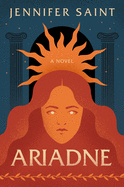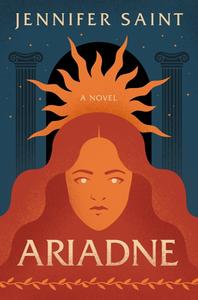
 Two silent princesses from Greek mythology step from the shadows to tell their stories in Jennifer Saint's passionate, assured debut novel.
Two silent princesses from Greek mythology step from the shadows to tell their stories in Jennifer Saint's passionate, assured debut novel.
Ariadne, eldest daughter of King Minos, and her younger sister Phaedra live under the pall of their family's shame. Thanks to their father's impiety, their mother Pasiphae gives birth to "Minos' greatest humiliation and greatest asset. My brother, the Minotaur." Although Ariadne and her mother try to love the carnivorous creature, his vicious nature makes him a natural weapon. Each year, Minos demands Athens send Crete 14 young people in payment for the death of his eldest son, Androgeos, killed near their city. The Minotaur hunts and devours the tributes in the Labyrinth under the palace, while Ariadne spins on her dancing floor to stop herself from imagining "the tearing of teeth through flesh."
In Ariadne's 18th year, the Athenian ship brings Prince Theseus, and Ariadne quickly falls for his "cold, calm green" eyes and stories of heroism. She decides to help him end the nightmare of the Labyrinth; in return, he promises to take her with him to Athens as his bride. Instead, Theseus betrays Ariadne, marooning her on an apparently uninhabited island. Rescued by the gentle god Dionysus, she finds a measure of happiness, while Phaedra, who believes Ariadne has died, must enter a loveless political marriage. Over the course of their lives, both sisters repeatedly experience "a truth of womanhood: however blameless a life we led, the passion and the greed of men could bring us to ruin, and there was nothing we could do." Separated by deceit, the daughters of Crete must fight for meaning in lives controlled by the whim of gods and men.
Saint's background in classical studies is apparent in her portrayal of self-interested gods and hapless mortals. Her focus on Ariadne, usually treated as a supporting character or footnote, allows her to highlight the powerlessness and scapegoating of women in patriarchal systems. Monsters, the narrative shows, need not have the heads of bulls; they may be fathers, husbands and heroes. Her heroines have complex, differing experiences of love, marriage and motherhood. Filled with luxuriant descriptions of pastoral ancient Greece, fearsome deities and frightening creatures, and unflinching, intelligently developed emotion, this shrewd commentary on the inner lives of overlooked women should resonate with fans of Madeline Miller's Circe and feminist fantasy. --Jaclyn Fulwood, blogger at Infinite Reads
Shelf Talker: Saint's debut is a deeply felt, well-executed feminist take on Greek mythology in the vein of Madeline Miller's Circe.

